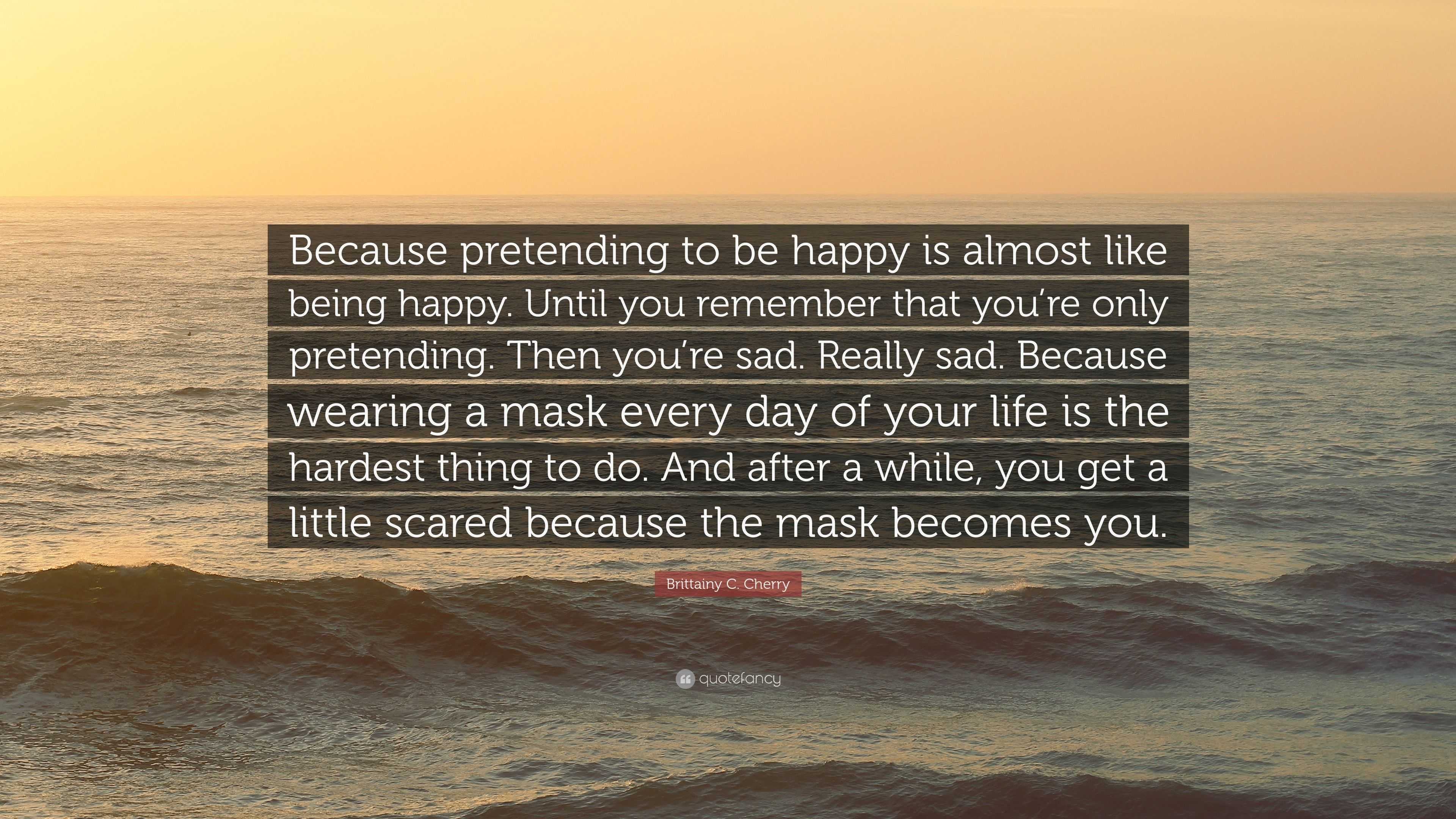Have you ever felt like the world expects you to wear a smile even when you're crumbling inside? Pretending to be happy quote has become a universal language for those who silently battle their inner demons while putting on a cheerful facade. It's like living in a movie where everyone's a star in their own highlight reel, but behind the scenes, the script reads differently. This phenomenon isn't just about faking smiles; it's a deep-rooted cultural expectation that often leaves people feeling isolated and misunderstood.
Life’s got this weird way of making us think we have to be happy all the time. But let's be real, happiness isn't a 24/7 gig. Sometimes, it's okay to feel down, and pretending otherwise can weigh heavy on your soul. Pretending to be happy quote speaks volumes about the silent struggles many of us face daily.
In this article, we'll dive deep into the world of pretending to be happy quotes, exploring their meaning, impact, and how they reflect the human condition. So, grab a cup of coffee, and let's unpack this together.
Table of Contents
- What Is Pretending to Be Happy?
- The History of Pretending Quotes
- Psychological Effects of Pretending
- Famous Pretending to Be Happy Quotes
- Cultural Impact of Pretending
- How to Stop Pretending
- Self-Care Tips for Genuine Happiness
- Pretending Quotes in Literature
- The Connection to Mental Health
- Conclusion: Embracing Authenticity
What Is Pretending to Be Happy?
Unveiling the Mask
Pretending to be happy is like wearing a mask that hides the real you from the world. It’s not just about plastering a fake smile on your face; it's an entire act designed to fit societal expectations. People do it for various reasons—fear of judgment, desire to fit in, or simply because they believe happiness is the default setting everyone should maintain.
But here's the kicker: pretending doesn't fix the underlying issues. It's like putting a band-aid on a bullet wound. Eventually, the truth will surface, and the emotional toll can be overwhelming. This is where quotes about pretending to be happy come into play—they give voice to the silent struggle.
The History of Pretending Quotes
Quotes Through the Ages
Pretending to be happy isn't a new concept. Throughout history, philosophers, writers, and thinkers have explored the complexities of human emotions. In ancient times, Greek philosophers like Aristotle discussed the importance of authenticity and living a life aligned with one's true self.
Fast forward to modern times, and you'll find countless quotes that touch on this theme. Authors like Virginia Woolf and poets like Sylvia Plath have eloquently captured the essence of pretending in their works. These quotes resonate because they reflect universal truths about the human condition.
Psychological Effects of Pretending
Burdening the Mind
The psychological effects of pretending to be happy can be devastating. Research shows that suppressing emotions leads to increased stress, anxiety, and even depression. When you constantly put on a happy face, you're essentially lying to yourself and others, which can erode your sense of self-worth.
Moreover, the pressure to maintain this facade can lead to burnout. It's like running a marathon with a heavy backpack—you'll eventually collapse under the weight. Recognizing these effects is the first step toward breaking free from the cycle of pretending.
Famous Pretending to Be Happy Quotes
Words That Resonate
Let's take a moment to appreciate some famous quotes that perfectly encapsulate the struggle of pretending:
- "Happiness is not something ready-made. It comes from your own actions." – Dalai Lama
- "We wear the mask that grins and lies, it hides our cheeks and shades our eyes." – Paul Laurence Dunbar
- "The saddest people I've ever met in my life are the ones who are smiling the brightest." – Unknown
These quotes remind us that happiness is a journey, not a destination. They encourage us to embrace our authentic selves and seek genuine joy rather than settling for superficial happiness.
Cultural Impact of Pretending
Social Media and the Pressure to Perform
In today's digital age, social media plays a significant role in perpetuating the culture of pretending. Platforms like Instagram and Facebook create an illusion of perfection, where everyone seems to be living their best life. This constant comparison can lead to feelings of inadequacy and the need to present a curated version of ourselves.
But here's the thing: what you see online isn't always reality. Behind those carefully edited photos and filtered posts, there's often a story of struggle and vulnerability. Recognizing this can help us break free from the pressure to pretend and embrace authenticity.
How to Stop Pretending
Steps Toward Authenticity
Stopping the act of pretending requires courage and self-awareness. Here are a few steps to help you on this journey:
- Accept your emotions: It's okay to feel sad, angry, or frustrated. Acknowledge your feelings without judgment.
- Communicate openly: Share your struggles with trusted friends or family members. Talking about your feelings can be incredibly liberating.
- Practice self-compassion: Be kind to yourself. Remember that no one is perfect, and it's okay to have bad days.
By taking these steps, you'll begin to shed the mask of pretense and embrace your true self.
Self-Care Tips for Genuine Happiness
Nurturing Your Inner Joy
Self-care is essential for cultivating genuine happiness. Here are some tips to help you on this path:
- Engage in activities that bring you joy, whether it's reading, painting, or hiking.
- Practice mindfulness and meditation to stay grounded in the present moment.
- Set boundaries and prioritize your mental and emotional well-being.
Remember, happiness is a personal journey, and what works for one person may not work for another. The key is to find what resonates with you and make it a part of your daily routine.
Pretending Quotes in Literature
Stories That Speak Truth
Literature is filled with characters who struggle with pretending to be happy. From Shakespeare's plays to modern novels, authors have explored this theme in depth. For instance, in F. Scott Fitzgerald's "The Great Gatsby," the character of Jay Gatsby embodies the illusion of happiness, striving for a dream that ultimately eludes him.
These stories remind us that pretending is a common human experience, and through them, we can find solace in knowing we're not alone in our struggles.
The Connection to Mental Health
Breaking the Stigma
Pretending to be happy can have serious implications for mental health. It's crucial to address this issue and break the stigma surrounding mental health challenges. Seeking professional help is a sign of strength, not weakness.
Therapy, counseling, and support groups can provide the tools and resources needed to navigate the complexities of pretending and find a path to genuine happiness. Remember, you don't have to face this journey alone.
Conclusion: Embracing Authenticity
Pretending to be happy quote serves as a mirror reflecting the struggles many of us face in our quest for authenticity. It's a reminder that happiness isn't about perfection; it's about embracing the imperfections and finding joy in the journey. By recognizing the impact of pretending and taking steps toward authenticity, we can create a more compassionate and understanding world.
So, the next time you feel the urge to put on a happy face, take a moment to pause and ask yourself: "Am I truly happy, or am I just pretending?" The answer might surprise you, and that's okay. Embrace the truth, and let it guide you toward a more fulfilling life.
Don't forget to share your thoughts and experiences in the comments below. Your story could inspire someone else on their journey toward authenticity. And if you found this article helpful, consider sharing it with friends and family who might benefit from the message. Together, we can create a world where pretending isn't the norm, but authenticity reigns supreme.


